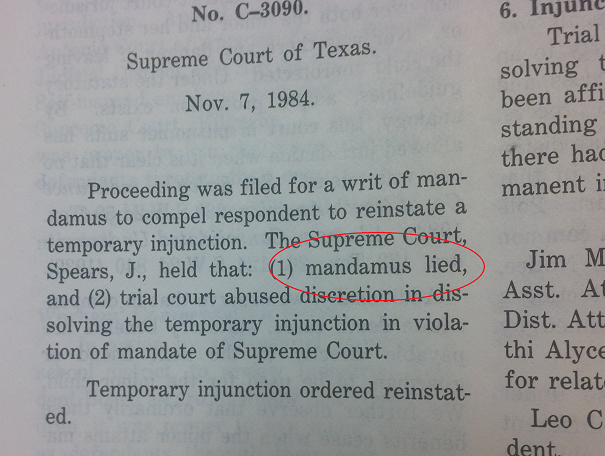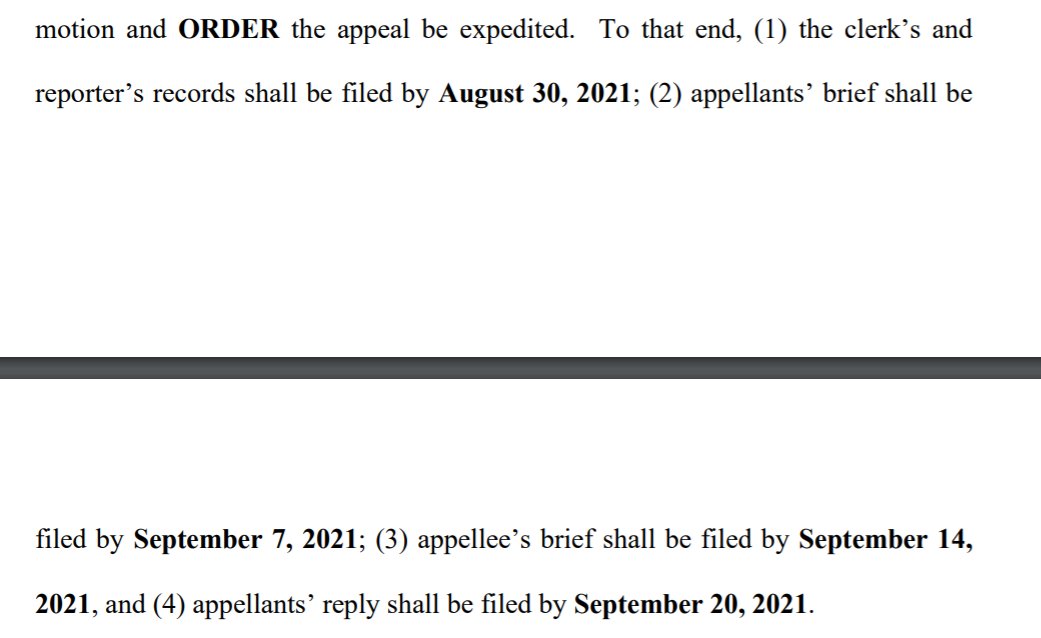Including deposition excerpts in a trial record can become complicated, and in American Pride Xpress Logistics v. Joe Jordan Trucks, it led to a preservation problem: “During appellee’s case in chief, it presented the testimony of Lee Cox, the attorney who prepared the deed …. Cox testified through a videotaped deposition. Before the testimony was played for the jury, appellants’ attorney told the court, ‘We have asked that the court reporter not transcribe this portion since we’ve got a transcript of it.’ However, the transcript of Cox’s testimony was not made part of the record. Without Cox’s testimony, the reporter’s record is incomplete, and we must presume his testimony supported the trial court’s judgment.” No. 05-20-00281-CV (Sept. 24, 2021) (mem. op.).
Monthly Archives: September 2021
“The preservation requirements of appellate rule 33.1 apply to arbitrations.” And just as in a traditional litigation setting, the lack of a record created preservation problems in Alia Realty LLC v. Alhalwani: “In addition to a silent record as to whether appellees informed the arbitrator that the extended time to file a supplemental expert report was insufficient before proceeding to arbitration, appellees failed to make any such complaints in two postarbitration briefs. Instead, they argued the evidence was insufficient to support the arbitration award because appellants’ expert’s opinions were unsupported speculation, and their expert, unlike appellant’s expert, used the proper accounting analysis by reconciling bank accounts.” No. 05-21-00265-CV (Sept. 23, 2021) (mem. op.).
 The Who memorably asked, “Who Are You?” In that spirit, the case of MBM Family Trust No. 1 v. GE Oil & Gas, LLC examined a claim that a trustee had acted solely in her individual capacity, rather than in her trustee capacity, and was thus not subject to personal jurisdiction in Texas in a judgment-collection lawsuit. Whatever theoretical force this argument may have had, the Fifth Court found that it lacked support in the testimony presented, which did not draw this distinction and which also presented credibility issues that the judge had resolved against the appellant. No. 05-20-01103-CV (Sept. 17, 2021) (mem. op.).
The Who memorably asked, “Who Are You?” In that spirit, the case of MBM Family Trust No. 1 v. GE Oil & Gas, LLC examined a claim that a trustee had acted solely in her individual capacity, rather than in her trustee capacity, and was thus not subject to personal jurisdiction in Texas in a judgment-collection lawsuit. Whatever theoretical force this argument may have had, the Fifth Court found that it lacked support in the testimony presented, which did not draw this distinction and which also presented credibility issues that the judge had resolved against the appellant. No. 05-20-01103-CV (Sept. 17, 2021) (mem. op.).
 “‘”Breach’” of a contract occurs when a party fails to perform an act that it has contractually promised to perform.’ Under terms of the agreement, Hinojosa merely agreed to allow the first $258,996.16 in proceeds from the sale to go to LaFredo with any remaining proceeds to be split between them. LaFredo does not identify any action taken by Hinojosa that precluded him from receiving any of the proceeds from the sale. To the contrary, the record before us suggests LaFredo received all the available proceeds, used a portion to pay for the Canton Street condominium, and signed a settlement statement reflecting his agreement to this disbursement. That LaFredo spent a portion of the proceeds to purchase the Canton Street condominium is not evidence, much less conclusive evidence, that Hinojosa breached the One Arts Plaza Agreement. Based on the record before us, we conclude LaFredo has not conclusively shown, as he must, that Hinojosa breached the One Arts Plaza Agreement.” Hinojosa v. LaFredo, No. 05-20-00166-CV (Sept. 20, 2021) (emphasis added).
“‘”Breach’” of a contract occurs when a party fails to perform an act that it has contractually promised to perform.’ Under terms of the agreement, Hinojosa merely agreed to allow the first $258,996.16 in proceeds from the sale to go to LaFredo with any remaining proceeds to be split between them. LaFredo does not identify any action taken by Hinojosa that precluded him from receiving any of the proceeds from the sale. To the contrary, the record before us suggests LaFredo received all the available proceeds, used a portion to pay for the Canton Street condominium, and signed a settlement statement reflecting his agreement to this disbursement. That LaFredo spent a portion of the proceeds to purchase the Canton Street condominium is not evidence, much less conclusive evidence, that Hinojosa breached the One Arts Plaza Agreement. Based on the record before us, we conclude LaFredo has not conclusively shown, as he must, that Hinojosa breached the One Arts Plaza Agreement.” Hinojosa v. LaFredo, No. 05-20-00166-CV (Sept. 20, 2021) (emphasis added).
 After a supreme court opinion earlier this year, the Fifth Court revisited the question whether PNC’s effort to foreclose a subrogation lien claim was time-barred. It held:
After a supreme court opinion earlier this year, the Fifth Court revisited the question whether PNC’s effort to foreclose a subrogation lien claim was time-barred. It held:
- Accrual. Recognizing that “Texas case law gives conflicting answers to this issue,” the Court concluded that “the correct result is the one first reached by Kone in 1927. The lender’s cause of action to enforce its subrogation lien rights accrues on the date the refinancing loan matures.” (citing Kone v. Harper, 297 S.W. 294 (Tex. App.–Waco 1927, aff’d, 1 S.W.2d 857 (Tex. Comm’n App. 1928)).
- Limitations period. The Court applied the four-year statute that governs other lien actions, reasoning: “PNC cannot, in the name of equity, have more rights than the party to which it is subrogated, and those rights are subject to the same defenses the borrower would have had against the original lender.”
PNC Mortgage v. Howard, No. 05-17-01484 (Sept. 17, 2021).
The allegedly overlapping fraud and contract claims in Benge General Contracting v. Hertz Electric were as follows:
- “Appellees’ breach-of-contract counterclaim was based on ‘enforceable agreements’ under which appellees agreed to provide ‘electrical contracting and painting services at several jobsites in North Texas’ in exchange for BGC’s promise to compensate appellees for the services.”
- “Their fraud counterclaim, as stated in appellees’ fourth amended counterclaims, was based on Dennie’s reliance [on] Benge’s allegedly false representation that he would pay for work performed by appellees ‘in exchange for the signing of lien releases.’ Appellees alleged that appellants knew the representations were false when made and omitted facts regarding Benge’s misappropriation of project funds otherwise intended to compensate appellees for work performed.”
The Fifth Court concluded: “Appellants characterize this counterclaim as fraud by omission and argue there is no evidence a special relationship to support such a claim. … The gravamen of appellees’ fraud counterclaim, however, was not that Benge fraudulently omitted information but that he fraudulently induced Dennie to sign lien waivers to obtain a payment he never intended to make; indeed, a payment already owed under the contracts. Thus, appellees stated a claim for fraudulent inducement.” No. 05-19-01506-CV (Sept. 7, 2021) (mem. op.) (later modified slightly on rehearing).
The peculiar treatment of attorneys’ fee awards against LLCs in contract cases, by the now-repealed version of CPRC § 38.001, led to the resolution of a novel issue in Benge General Contracting, LLC v. Hertz Elec., LLC: “Absent mandatory, or at least persuasive, authority applying the alter-ego theory to hold an LLC’s members liable for attorney’s fees that could not be incurred by the LLC, we must abide by the plain statutory language. Accordingly, we conclude that the trial court abused its discretion in awarding attorney’s fees, and we sustain appellants’ first issue.” No. 05-19-01506-CV (Sept. 7, 2021) (mem. op.).
Judge  Gregg Costa memorably described the McDonnell-Douglas burden-shifting framework as “the ‘kudzu’ of employment law.” Nall v. BNSF Railway Co., 917 F. 3d 335 (5th Cir. 2019) (Costa, J., specially concurring). The painstaking majority and dissenting opinions in Addante v. Univ. of Tex. at Dallas, No. 05-20-00376-CV (Sept. 8, 2021) illustrate the amount of detail work required to evaluate a complex retaliation case and deserve study by anyone who practices in that area in state court.
Gregg Costa memorably described the McDonnell-Douglas burden-shifting framework as “the ‘kudzu’ of employment law.” Nall v. BNSF Railway Co., 917 F. 3d 335 (5th Cir. 2019) (Costa, J., specially concurring). The painstaking majority and dissenting opinions in Addante v. Univ. of Tex. at Dallas, No. 05-20-00376-CV (Sept. 8, 2021) illustrate the amount of detail work required to evaluate a complex retaliation case and deserve study by anyone who practices in that area in state court.
In a supersedeas-bond dispute, the Fifth Court held: “When Real Parties withdrew the deposit without the court’s authorization, they assumed the risk that their withdrawal might be improper and that the court might require them to redeposit the funds. Moreover, Real Parties received the full benefit of having the partition-and-sale order superseded during the years that the order was on appeal. The trial court may determine whether equity requires ordering Real Parties to return the supersedeas to the court’s registry for the court to determine the amount of Relators’ damages during the appeal.” In re Pelley, No. 05-21-00314-CV (Aug. 31, 2021) (mem. op.) (emphasis added).
 The successful party in an arbitration obtained confirmation of the award before the trial court ruled on the other party’s special appearance. The Fifth Court reversed, citing TRCP 84 and 120a as well as its own precedent: “Jayco was entitled to have its special appearance adjudicated prior to any decision on the merits. The rules of civil procedure give a trial court no discretion to hear a plea or pleading, including a motion to confirm an arbitration award, before hearing and determining a special appearance.” Jayco Hawaii LLC v. Viva Railings, LLC, No. 05-20-00528-CV (Aug. 25, 2021) (mem. op.) (citations omitted, emphasis added).
The successful party in an arbitration obtained confirmation of the award before the trial court ruled on the other party’s special appearance. The Fifth Court reversed, citing TRCP 84 and 120a as well as its own precedent: “Jayco was entitled to have its special appearance adjudicated prior to any decision on the merits. The rules of civil procedure give a trial court no discretion to hear a plea or pleading, including a motion to confirm an arbitration award, before hearing and determining a special appearance.” Jayco Hawaii LLC v. Viva Railings, LLC, No. 05-20-00528-CV (Aug. 25, 2021) (mem. op.) (citations omitted, emphasis added).


